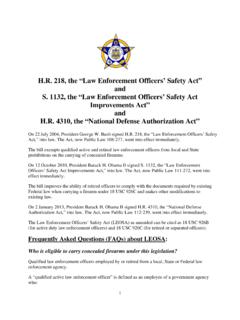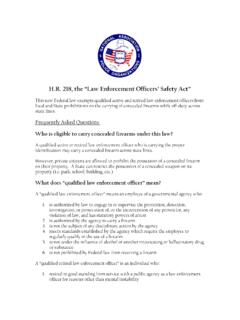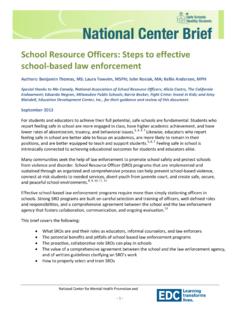Transcription of Florida Mortality Study - Florida State FOP
1 Florida Mortality Study : Florida Law enforcement and Corrections Officers compared to Florida General Population Presented by Sheriff Jack Parker October 17, 2011. 1. Table of Contents Page 3 - 4: Executive Summary Page 4: Graph 1: Comparisons of Deaths Page 5-13: Florida Mortality Study Page 7: Table 1: DOH Menu Illustration Page 8: Graph 2: All General Population Florida Deaths Page 8: Graph 3: FRS Special Risk Deaths Page 10: Conclusion Page 11: Table 2: DOH Age of Death Data Table Page 12: Table 3: FRS Age of Death Data Table Page 13: References 2.
2 Florida Mortality Study : Florida Law enforcement and Corrections Officers compared to Florida General Population Executive Summary During the 2011 Legislative Session, changes made to the Florida Retirement System (FRS) extended by five years both the age and the years of service necessary to retire for members of the special risk class which includes law enforcement and corrections officers. The stated justification for the change was the assumption that special risk class members are living longer and now have life spans similar to that of the general population.
3 This assumption was derived without the benefit of conducting any studies in the State of Florida . The assumption also conflicts directly with well- established medical theory and other scientifically conducted longitudinal studies regarding the lifespan of law enforcement officers. To verify whether there is a lifespan difference between the law enforcement and corrections special risk class members and that of the general population in Florida , data was derived from the FRS and the Florida Department of Health. The comprehensive data was analyzed and compiled to establish an accurate "average age at death".
4 Comparison between FRS special risk class members (Law enforcement and Corrections Officers) and the State of Florida general population. The actual death rates between the two groups were compared during the most recent decade beginning in year 2000 and ending in 2009. It was determined the average age at death for FRS special risk class members assigned to law enforcement and corrections duties was years, while the average age of death for Florida 's general population was almost 12 years longer at years (approximately 19% longer life spans).
5 This report clearly demonstrates that FRS special risk class members assigned to law enforcement and corrections duties do not enjoy a similar lifespan as compared to the population they serve and the 2011 changes to the FRS requiring officers to work to age 60 was based on an invalid assumption. The following graph illustrates the difference in life spans of Florida law enforcement and corrections officers as compared with Florida 's general public: 3. Law enforcement & Corrections Officers compared to Florida 's General Population Legend FRS Special Risk 300,000 300.
6 Gen Population 300. 250,000 Florida 's Officers 250. (FRS) Age of Death 250. 200,000 200. Number of Deaths 200. 150,000 Florida 's General 150. Population Age at 150 Death 100,000 100. 100. 50,000 50. 0 0. 21. 26. 31. 36. 41. 46. 51. 56. 61. 66. 71. 76. 81. 86. 91. 95. -2. -3. -3. -4. -4. -5. -5. -6. -6. -7. -7. -8. -8. -9. -9. -1. 5. 0. 5. 0. 5. 0. 5. 0. 5. 0. 5. 0. 5. 0. 5. 00. Age at Time of Death Graph 1 - Graph Comparing Florida 's (FRS) Law enforcement and Corrections Officers with Florida 's General Population regarding age of death.
7 It is requested the Florida Legislature submit and pass bill language in this legislative session in both the Florida House and Florida Senate, and that Governor Scott sign into law, corrective statutory language that will return special risk members in the Florida Retirement System to the appropriate special risk retirement age of 55 or 25 years of service. It is further requested those FRS special risk members hired on or after July 1st of 2011 be retroactively included in the legislative change. If you have any questions regarding this report or this legislative request, please contact Sheriff J.
8 R. "Jack" Parker, by calling 321-264-5201 or by email at or by mail at Brevard County Sheriff's Office, 700 South Park Avenue, Titusville, Florida , 32780. 4. Florida Mortality Study : Florida Law enforcement and Corrections Officers compared to Florida General Population Introduction A commonly held belief among policymakers and the public is that law enforcement officers, by nature of their profession, have a shorter life expectancy than the general population. Law enforcement work is riddled with stressors that exist throughout the career of the officer .
9 Officers function in a constant State of stress and it is a major contributor to the earlier death suffered by law enforcement and corrections professionals. The negative impact of stress on life span is not a disputed fact and acts as one of the justifications that granted special risk members a retirement age commensurate with their life span and service to our citizens. i In a cost-cutting measure, during the 2011 legislative session, the Florida Legislature extended the years of service and age requirements for Special Risk class members.
10 Many in Florida 's law enforcement community expressed concern that extending the retirement age from 55 to 60 years for law enforcement and corrections officers was dangerous both for the officer and for the public. Research Parameters The research focuses on a ten-year period ranging from 2000 to 2009 and is specific to Florida . Given the State of current research in this area, statistical data was acquired from reliable and valid sources relating specifically to the general population in the State of Florida and FRS special risk population.







